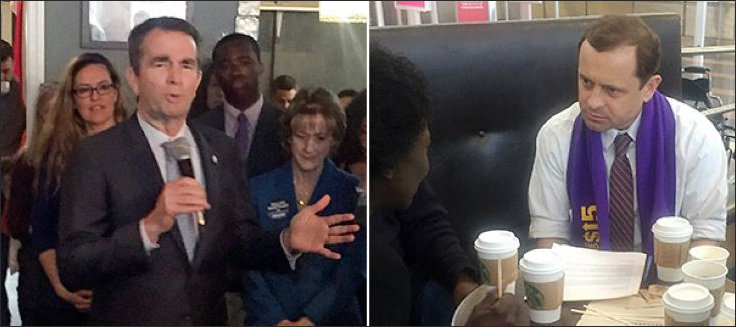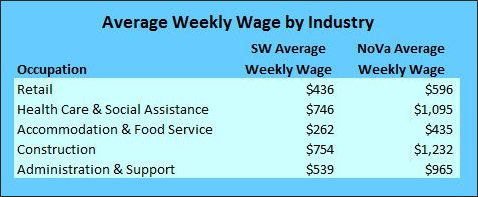
Let there be higher wages! Ralph Northam (left) and Tom Perriello on the campaign trail in Northern Virginia where they promoted a $15 minimum wage. (Photo credit: Washington Post)
Both Democratic candidates for governor, Ralph Northam and Tom Perriello, have endorsed a statewide $15-per-hour minimum wage, a sign, says the Washington Post, of how much momentum the national “Fight for $15” is achieving. (Virginia hews to the federal minimum wage of $7.25 per hour, which has not increased since 2009.)
Perriello backed the $15 minimum wage shortly after declaring his candidacy, and Northam followed the next day. Both candidates reiterated their support earlier this week when aligning themselves with striking workers at Reagan National Airport. Reports the Post:
“I would challenge anyone out there to go try to support themselves and support their families on $7.25 an hour,” Northam said Wednesday after his meeting with workers. “It is impossible. You can’t do it.” He said he would push to raise the minimum wage as governor by campaigning to unseat Republican lawmakers opposed to it.
“We know we have a long way to go,” Perriello told a wheelchair handler during his Thursday visit, wearing a purple Fight for $15 scarf. “This is about the dignity of work, but it’s also about economic growth in our community.”
Bacon’s bottom line: Economists have haggled endlessly for decades over the effects of the minimum wage, with neither side dealing a knockout blow. But it’s safe to say that the minimum wage would have the greatest impact on labor markets in areas where prevailing wages are the lowest — and in Virginia, those are rural areas.
Start by asking the following question: Why not raise the minimum wage to $30 an hour? Or $100 an hour? Because, even liberal economists will concede, employers will lay off workers who don’t deliver $30 or $100 in economic value. At some point the wages lost by those who lose their jobs will exceed the wages gained by those who received a pay raise. At that point the minimum wage becomes indisputably destructive. The question is at what hourly wage that threshold is crossed.
It is conceivable that a $15 minimum wage will work in the Washington metropolitan area in the sense that wage gains for lower-income workers will exceed the wages lost from employees who lose their jobs. That’s because Washington is already a high-cost-of-living, high-wage labor market, and the differential between prevailing market wages and the $15-per-hour minimum wage is relatively modest. The picture is very different in economically depressed Southside and Southwest Virginia communities where one of the few competitive advantages in the economic-development arena is a lower cost of living and a lower wage base.
The Virginia Employment Commission publishes labor market profiles of the Southwest Virginia Workforce Investment Area here and the Northern Virginia Workforce Investment Area here. Below, I extracted the average weekly wages for the largest occupational categories in Southwest Virginia (excluding government and mining/oil and gas/extraction).

For purposes of comparison, someone earning the current minimum wage and working 40 hours a week would earn $290 per week, while a $15-per-hour minimum wage would equate to $600 per week.
Clearly, such a minimum wage would have a greater impact on SW Virginia workers than NoVa workers where the average weekly wage (and by implication the average hourly wage) is 50% to 75% higher. On the plus side, the pay of SW Virginians would jump more… if they could hang onto their jobs. And there’s the rub. How many could hang onto their jobs after such a massive disruption to labor markets? While some SW businesses might survive by laying off marginal employees, one has to ask, others couldn’t even stay in business. Would a Pizza Hut franchise be able to keep the doors open if its cost of labor doubled? If not, how many business owners, store managers and others earning above the minimum wage also would lose their jobs?
Beyond the immediate impact, what would be the consequences for long-term job development? Would any corporation consider investing in SW Virginia, a region in which 11% of the workforce has an 8th grade education or less and another 12% has “some” high school, if the minimum wage were $15?
The idea of a $15-per-hour minimum wage was born in affluent urban areas with a high cost of living. It is totally inappropriate for poor rural areas with low living costs, low wage structures and high unemployment. I can think of no economic policy that would be more disastrous for Virginia’s rural regions.


